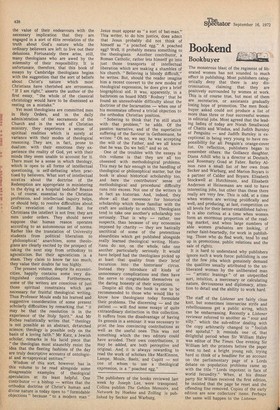Bookend
Bookbuyer
The monstrous blast of the regiment of liberated women has not sounded to much effect in publishing. Most publishers categorically deny that there is any discrimination, claiming that they are positively surrounded by women at work. This is of course true, but most of them are secretaries, or assistants gradually losing hope of promotion. The men Bookbuyer asked could not produce a list of more than three or four successful women in editorial jobs. Most agreed that the leading ladies of today are Norah Smallwood of Chatto and Windus, and Judith Burnley of Penguins — and Judith Burnley is exceptional in being very young to have responsibility for all Penguin's orange-cover list. On reflection, publishers began to remember others: the Gollancz daughter, Diana Athill who is a director at Deutsch, and Rosemary Goad at Faber. Barley Alison runs a small list of her own from Secker and Warburg, and Marion Boyars is a partner of Calder and Boyars. Elisabeth Stockwell at Hutchinson, and Elisabeth Anderson at Heinemann are said to have interesting jobs, but other than these there really are very few. This is odd, at a time when women are writing prolifically and well; and producing, at last, competition on all levels for their better-established halves. It is also curious at a time when women form an enormous proportion of the reading market, and when large numbers of able women graduates are looking, if rather faint-heartedly, for work in publishing. Those who do find work, tend 'to end up in promotions, public relations and the sale of rights.
It is hard to understand why publishers ignore such a work force: publishing is one of the few jobs which genuinely demand the qualities usually attributed to the unliberated woman by the unliberated man "artistic leanings" of an unspecified sort, intuition, a mercenary or calculating nature, deviousness and diplomacy, attention to detail and the ability to work hard.
The staff of the Listener are fairly close knit, but sometimes internecine strife and rebelliousness get a public airing, which can be embarrassing. Recently a Listener reviewer referred to another as " sour and silly," which the sub-editor dealing with the copy arbitrarily changed to " foolish and spiteful." It reminds one of_ that delightful period when Sir William Haley was editor of The Times. One evening Sir William left the printers before the paper went to bed: a bright young sub, trying hard to think of a headline for an account on the parliamentary page of a Lords debate on population problems came up with the title " Lords impotent in face of world fecundity." When, at his dinner party Sir Wiliam received the first edition, he insisted that the page be reset and the offending line removed. Copies of the early edition are now collectors' items. Perhaps the same will happen to the Listener.


































 Previous page
Previous page